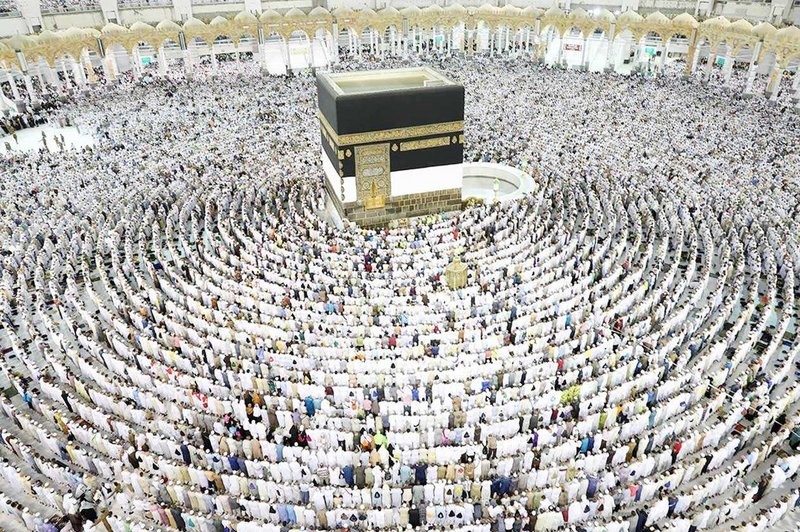Hajj – the Fortifier of Religion

In her famous sermon known as “Al-Khuṭbah al-Fadakiyah”, the Blessed Lady Fatimah al-Zahra (sa) sheds light upon the philosophy and wisdom behind several acts of Islamic ritual worship. While discussing Ṣalāt (i.e. Islamic ritual prayer), Ṣiyām (i.e. Islamic ritual fasting) and Zakāt (i.e. Islamic ritual alms), her discourse mainly focuses on the personal and individual aspects of these devotional acts of servitude towards God. However, from hence onwards, her sermon starts shifting slowly and steadily towards highlighting the societal and communal dimensions of religious rites. As such, she talks about the annual Ḥajj pilgrimage and says, “… and (the Almighty has decreed) the Ḥajj as a fortifier of religion”.
Indeed, many Islamic teachings are dedicated to matters dealing with communal and collective issues, and such matters enjoy a significant degree of importance in this creed. Despite this fact, Muslims generally pay little heed to Islam’s social doctrines and directives and seldom ponder upon its guidelines in this regard. One of the blessings of the Islamic Revolution of Iran is that it brought Islam’s social laws and values to the centre stage, introducing people to the wisdom of Islam’s social commandments while also making them aware of their responsibilities and duties in this respect. Before the revolution, discussions of this sort were rarely brought up in religious circles. During that time, topics of an individual nature, like Ṣalāt, Ṣiyām and other personal acts of worship were the main subjects of focus, while Islamic instructions about politics, as well as other social issues, were largely ignored. Even if a scholar chose to speak or write about such themes, his words were not met with any noticeable interest. Without a doubt, the Muslim nation owes an outstanding debt of gratitude to Imam Khumayni (ra) for having revived and resurrected this previously suspended portion of Islam’s radiant teachings. This illustrious sage rendered an unparalleled service by acquainting us to topics such as the Islamic system of governance, the mandatory qualifications of an Islamic ruler, the duties and powers of an Islamic leader, and many other similar issues that we find to be necessary today. Nowadays, various researchers systematically study these matters, but their limited work is insufficient, and a lot more work and effort needs to be invested in these areas.
Ḥajj; Practicing Servitude Towards God
Apart from its social and communal dimension, Ḥajj represents an act of ritual worship with significant effects at an individual level. As such, we find that a pilgrim practices pious servitude towards God while performing the Ḥajj. During the Ḥajj season, he is freed of all material, familial and otherworldly preoccupations. He can secure an opportunity to create for himself a close link with the Almighty and serve Him with all sincerity. If we were asked to point out one of the best advantages of the Ḥajj pilgrimage, we would probably highlight its function as an exercise in virtuous servitude.
I will now narrate something that I learned from a renowned and devout religious orator during the days of my youth. I had just arrived in the holy city of Qum and had started familiarising myself with the academic environment of the seminary called Fayḍiyah. There I became acquainted with the Late Shaykh ‘Ali Akbar Turbatī. In those days, numerous religious ceremonies and lecture sessions were routinely held at the Fayḍiyah School, wherein senior orators and preachers would come to deliver speeches. These scholars were profoundly spiritual and pious, very well-versed and knowledgeable, and experts in the fine art of oratory. Therefore, their sermons were a cherished source of advice and guidance for all listeners. Indeed, attending these lectures was not only beneficial in terms of increasing one’s knowledge but was also a great example in terms of learning how to speak and preach before an audience. One of those famous orators was the Late Shaykh ‘Ali Akbar Turbatī (may Allah bless his soul). He was one of the students of the Late Mirzā Jawād Āghāye Malakī Tabrīzī (may Allah bless his soul) and had attended and benefitted from the latter’s lectures on Islamic ethics. He was a spiritually purified individual whose sermons proved very effective and influential. During one Ḥajj season, he went to the pulpit and spoke about this particular religious rite. He emphasised that one of the most significant benefits of the Ḥajj pilgrimage was that it represented an exercise in pious servitude, whereby a pilgrim could practice being genuinely obedient towards God. I remember that he said: Apart from learning religious commandments themselves, it is also desirable for human beings to learn the wisdom behind various religious laws. This strengthens a believer’s faith and allows him to understand that God’s directives are not purposeless or arbitrary. For this very reason, the Holy Quran and the Immaculate Imams (as) have informed us of such wisdom in their sayings and sermons[1]. However, one should refrain from developing a mindset that only obeys God’s commandments because they bring about specific benefits. We seldom think about obeying the Almighty simply out of a sense of pure and self-less servitude, without taking into consideration the advantages involved. The Arabic word Ta’abbud (or servitude) is derived from the root form ‘Abd meaning slave, and therefore Ta’abbud signifies “to act in a slave-like manner”. A servant of God must train himself to obey God’s commandments simply because they are God’s commandments. He must repeatedly tell himself that all of God’s laws must invariably be obeyed, even if they may seem detrimental to his interests. A pious servant of God must be obedient to his Lord in the most absolute of senses because his entire existence is nothing but an instance of his Master’s mercy and benevolence. Thus, he must show total submission and compliance when his Master addresses him and states, “You must use your body parts and organs, which I have bestowed upon you, only to act as I wish and command”. The various rites and rituals of the Ḥajj pilgrimage serve to compensate for and rectify this particular flaw and weakness in our thoughts and actions.
While performing the rites of the Ḥajj pilgrimage, God commands the pilgrim to encamp at a specific location on a particular day and time. The pilgrim must obey this directive without harbouring or expressing any objection towards the time or place designated by the Almighty. Then, God commands the pilgrim to abandon the aforementioned location at a specific time, neither earlier nor later. Similarly, while performing ritual circumambulations around the Holy Ka’bah, the pilgrim must complete several revolutions around a house made of stone. Again, the pilgrim is not allowed to question this divine decree. The same is true concerning all other rituals in the Ḥajj pilgrimage. If a faithful servant of God were to be asked why he performs the actions above, he would reply in a single sentence, saying that the Almighty has commanded him to do so and that His commandments are to be obeyed without reluctance or exception. From this point of view, it can be said that one of the essential characteristics of the Ḥajj pilgrimage is that it trains an individual in the art and discipline of devout servitude.
To comprehend the meaning and essence of pious servitude, one must review the story of Prophet Ibrāhīm (as) and his son, Prophet Ismā’īl (as). Prophet Ibrāhīm (as) received divine revelation in a dream wherein he saw himself sacrificing his son Ismā’īl (as). He immediately understood that it was his religious duty to perform the action he had witnessed in what he knew was a divinely inspired dream. Just as the Almighty’s prophets and apostles can accurately discern the voice of archangel Jibra’īl (as) from all others, being insusceptible to any error in this regard, similarly they are capable of distinguishing divinely inspired dreams from ordinary ones while being impervious to any confusion or mistake in this matter. As such, Prophet Ibrāhīm (as) knew that he had to sacrifice Ismā’īl (as) to fulfil the divine prophesy he had witnessed in his dream. Ismā’īl (as) was an exceptionally handsome, respectable and well-mannered youngster, whom God had granted to Ibrāhīm (as) during his old age. Prophet Ibrāhīm (as) used to live in what is today known as the Levant. However, when Ismā’īl (as) was still an infant, God had ordered Ibrāhīm (as) to take him and his mother to a barren and arid valley surrounded by the hills of Mecca and settle them there. As the years went by, Ismā’īl (as) grew into a fascinatingly good-looking young man, and Ibrāhīm (as), who every so often visited his family in Mecca. He would draw great pleasure from seeing his son become more and more radiant by the day. Yet, when Ibrāhīm (as) saw himself sacrificing the apple of his eye in a divinely inspired dream, he instantly knew he was obliged to fulfil the said prophesy.
God Almighty did not inform Ibrāhīm (as) of this particular duty through verbal revelation. He did not send the archangel Jibra’īl (as) to Ibrāhīm (as) to tell him to sacrifice his beloved son. Instead, God visualised and manifested the entire event in front of Ibrāhīm’s eyes in the form of a lucid dream. The purpose behind this sort of divine communication may have been to avoid giving Ibrāhīm (as) a direct and explicit verbal command. If the Almighty had said, “Sacrifice thy son”, His decree would have been directly and invariably linked to sacrificing Ismā’īl (as), and fulfilling this commandment would have been contingent upon killing him. At the same time, the Almighty’s real intention had nothing to do with Ismā’īl’s death. Instead, God’s actual command was simply for Ibrāhīm (as) to place a knife at Ismā’īl’s throat and nothing more. However, to test Ibrāhīm’s faith and pious resolve, God wished to hide this fact from the elderly prophet, making him believe that his religious duty was to go forward with the actual sacrifice. By presenting Ibrāhīm (as) with a dream, wherein he saw himself placing a dagger at his son’s throat, God effectively provided a visual exhibition that Ibrāhīm (as) could readily interpret in a manner that would lead him to believe that his duty was to sacrifice Ismā’īl (as) indeed. However, since God never intended to see Ismā’īl (as) being slaughtered, Ibrāhīm’s divine examination came to a close at the very moment he pressed his blade upon his obedient son’s throat. Thus, Ibrāhīm (as) emerged triumphant from this heavenly trial, and the Almighty addressed him, saying, “You have indeed fulfilled the vision!”[2]
Another point about this demanding divine test is the spiritual and existential excellence demonstrated by Prophet Ismā’īl (as). Before attempting to fulfil his divinely inspired vision, the blessed Prophet Ibrāhīm (as) had discussed his dream, as well as the duty it entailed, with Ismā’īl (as). The Holy Quran narrates this unique conversation in these words, “When he (i.e. Ismā’īl) was old enough to assist in his (father’s) endeavour, he (i.e. Ibrāhīm) said, ‘My son! I see in a dream that I am sacrificing you. See what you think’.” [3] Upon hearing this, the blessed Prophet Ismā’īl (as) replied, “Father! Do whatever you have been commanded”[4]. Immediately, Ismā’īl (as) felt that his father was deeply concerned. He saw that his father was worried that he might not endure such a colossal test. Hence, he reassured Prophet Ibrāhīm (as) and said, “If Allah wishes, you will find me to be patient”[5].
Interestingly, Ismā’īl (as) did not neglect to say, “If God so wishes”. He openly declares that his confidence is not rooted in self-reliance or a sureness towards his abilities and entity being this sentence. Instead, his reliance is solely upon God Almighty, and that he can never be free of needing God’s help and support. Such profound wisdom and devout reverence emanate from these glorious words. Even after thousands of years, one can observe that this youngster was truly endowed with a sublimely elevated level of merit and excellence. Indeed, after listening to these sentences, one has no choice but to fall in love with this exceptional and admirable personality.
Prophet Ibrāhīm (as) solemnly believed that all divinely ordained duties and commandments were firmly based upon perfect rationality and supreme wisdom. He held absolute conviction that these laws could never be purposeless or frivolous. Consequently, one fails to find even a single clue of grievance or dissent in any of his words. He never questioned his Lord, saying, “What crime has this young man committed for him to deserve death at the hands of his father?” He never demanded that God change his designated duty by saying, “O’ Lord, if this young man must die, let another sacrifice him!” Indeed, not even an iota of doubt or hesitation existed in the hearts and minds of Ibrāhīm (as) and Ismā’īl (as). The Holy Quran talks of this unbreachable iron resolve in these words, “So when they had both submitted (to Allah’s will), and he had laid him down on his forehead, We called out to him, ‘O Ibrāhīm! You have indeed fulfilled the vision! Thus indeed do We reward the virtuous! This was indeed a manifest test.’ Then, We ransomed him with a great sacrifice”[6].
After both father and son had wholeheartedly submitted and surrendered themselves to God’s will and pleasure and had prepared themselves entirely to perform their divinely decreed duty, the Almighty sent forth His most trusted archangel Jibra’īl (as) with a sacrificial lamb to replace Ismā’īl (as) as the ordained sacrifice[7]. This was the greatest trial that Prophet Ibrāhīm (as) faced and successfully overcame. One cannot even imagine a test that could be greater or more difficult than asking an older man to sacrifice his teenage son without the latter being guilty of any sin or transgression.
Indeed, we need to travel to the sacred land where this grand event took place to relive this story, and by doing so, be able to catch a whiff of the sweet scent of genuine servitude. This might help us comprehend how a servant must act about his Lord and Master.
A pilgrim performing the Ḥajj is obliged to ritually sacrifice an animal in remembrance of Prophet Ibrāhīm’s greatest trial. He must also visit the places where Satan had appeared before Ibrāhīm (as) in an attempt to sway him away from performing his divinely ordained duty. Herein, he must throw pebbles at designated pillars representing Satan to remind himself that overcoming Satan’s obstacles by remaining steadfast in the face of all temptations and devilish doubts is a prerequisite to gaining success in all divine tests and trials. The wicked Devil connives and conspires in the most complicated of manners. In a situation such as that faced by Prophet Ibrāhīm (as), he may even come forward with arguments of a seemingly religious nature. As such, he may whisper into a believer’s ear and say, “This act represents murdering an innocent soul and is most definitely prohibited by religious law. Indeed, it is a colossal sin to shed blood without due cause”. In this way, Satan continuously tries to create uncertainty and scepticism within the hearts and minds of religious and devout human beings. If a believer pays heed to these satanic whisperings, he will ultimately be led astray. The key to remaining immune against such attacks is to acquire one’s religious duty from verified and authoritative sources. Once a person’s religious responsibility has been accurately established in this manner, he must ignore any malicious doubts and unwarranted suspicions that come his way.
By going to the holy land where Ibrāhīm (as) triumphantly fulfilled his divinely ordained mission and performing rites and rituals that symbolically represent his utmost sincerity and submission before the Almighty, a believer effectively learns and strengthens his spirit of obedience and servitude towards God.
Ḥajj; The Flourishing of the Global Economy
A look at the sacred verses of the Holy Quran reveals that the Quran has mentioned certain advantages related to the Ḥajj pilgrimage and its various rites and rituals. One such Quranic verse states, “Allah has made the Ka’bah, the Sacred House, a (means of) sustentation for mankind”[8].
This verse clearly shows that the Holy Ka’bah is a place that furnishes the groundworks for people to rise, be motivated and remain energetic and active. This means that if the sacred Ka’bah had not existed, people would have fallen into a state of apathetic lethargy, and societies would have stagnated. Thus, the Ka’bah instils much-needed vitality and liveliness in the Muslim society.
Similarly, when God Almighty wanted to encourage believers to perform the Ḥajj pilgrimage, He addressed them by saying, “… so that they may witness the benefits (that Ḥajj brings) for them, and mention Allah’s Name during the known days over the livestock He has provided them. So eat thereof, and feed the destitute”[9]. Precise details of these benefits mentioned by the Holy Quran can be found in the narrated traditions. In these sacred texts, the Immaculates (as) have informed us of the worldly advantages of the Ḥajj pilgrimage and its otherworldly rewards exclusive to the Hereafter[10]. One of the beneficial impacts of the Ḥajj, as highlighted by these narrated traditions, is that this unique international pilgrimage provides an opportunity for Muslims from all over the world to meet and recognise one another. This way, they can interact, engage and learn many new things from their mutual exchanges. Likewise, these interactions can also bring about economic gains, allowing them to realise fruitful business prospects in different countries and regions. In the book titled ‘Uyūn Akhbār al-Riḍā, we find a narration that says, “During the Ḥajj pilgrimage, people who reside in the East and the West, and those who live on land and upon the seas, gain access to many advantages. These benefits are shared by those performing the Ḥajj as well as those who are merely bystanders from amongst merchants, tourists, sellers, buyers, businessmen and even the needy”[11].
Ḥajj; A Manifestation of the Grandeur of Religion
The Blessed Lady Fatimah al-Zahra (sa) points out another critical benefit of the Ḥajj pilgrimage, which effectively outweighs all others. She states, “… and (the Almighty has decreed) the Ḥajj as a fortifier of religion”.
The fortification of any given building makes it sturdier, more beautiful and raises it to new heights. As such, Lady Fatimah al-Zahra (sa) indicates that the annual Ḥajj pilgrimage serves to elevate further and reinforce the edifice of God’s religion, increasing it in strength and grandeur. Herein, we may ask how the Ḥajj manages to exert such an influence. Does it mean that the existence of the sacred Ka’bah stimulates construction activity in areas around itself, leading to the formation of tall buildings in its vicinity? Today, we see that the Ka’bah has been surrounded by exceptionally grandiose skyscrapers that charge astronomical fees to accommodate pilgrims during the Ḥajj season. Does the rise of such gigantic urban structures in an unforgivingly barren and rugged region represent a bolstering of the foundations of religion? Obviously, it does not.
When Lady Fatimah al-Zahra (sa) mentions the consolidation and fortification of religion, her words may mean that if God had not legislated the Ḥajj and Muslims were not obliged to congregate so massively in Mecca on an annual basis, the power and majesty of Islam would have remained hidden from the eyes of the world. Through such a magnificent religious ceremony, the greatness of Islam and the Muslim nation is communicated to all other peoples and nations. Witnessing such a glorious sight, or even hearing about it, can profoundly influence non-Muslim individuals, causing them to ponder: “What is this extraordinary force and magnetism that draws people from all over the globe, making them gather in the millions in a dry and desolate desert devoid of any kind of luxuries and entertainment?”
Pilgrims performing the Ḥajj patiently endure substantial difficulties, tolerating the challenges brought about by hot and cold weather, to unite with one another and form a gigantic congregation of worshippers. This proverbial ocean of pious servitude solemnly engages in the virtuous remembrance of God, supplicating to Him in perfect unison and pleading to Him for forgiveness. This one-of-a-kind spiritual experience creates an astonishing psychological effect on the human heart. It furnishes the necessary grounds for humanity to comprehend the true glory of religion.
Ḥajj; The Growth of Global Spirituality
In His infinite benevolence and limitless mercy, God Almighty has left no stone unturned in His effort to influence the souls of His servants positively and lead them to heavenly perfection. For this very purpose, He has opened up numerous paths in front of them so that they may naturally be motivated to focus their attentions upon their Lord and express to Him their sincere humility and devout submission. Indeed, cultivating one’s relationship with the Divine and wholeheartedly submitting oneself to His will and pleasure is the only way for a human being to achieve spiritual development and existential excellence, thereby fulfilling the very goal of his creation. Therefore, despite the many difficulties involved in performing the Ḥajj, the Almighty has emphasised inviting all Muslims to carry out this religious obligation. In the past, even people living in countries and regions immediately neighbouring the land of Hijaz found it very hard to travel to Mecca to perform the Ḥajj pilgrimage, not to mention those who resided in far off countries like China, Indonesia, Chile etc. Yet, regardless of this fact, God Almighty addressed Prophet Ibrāhīm (as) and said, “And proclaim the ḥajj to all people: they shall come to you on foot and lean camels coming from distant places”[12].
The philosophy behind this divine invitation towards the Ḥajj is that no other factor can create such global motivation in people to move in the direction of spirituality. The Ḥajj is not a personal ritual related to small and limited groups. Instead, it constitutes a metaphorical ocean that unites thousands of rivers and streams as they come together to supplicate before God in flawless unison and elegant harmony. ‘Allāmah Ṭabāṭabāyī (ra) narrates that his teacher and sage, the late Ayatullah Qāḍī (a), said, “Sometimes the Almighty afflicts a person with sickness, poverty or some other form of tribulation for an entire year just so that he may remember God a single time and sincerely call upon him once saying: O’ Allah! This means that remembering the Almighty and supplicating to Him by saying: O’ Allah! is so productive in leading a person towards true and holistic prosperity that it becomes worthwhile for him to suffer an entire year for him to utter these words sincerely”.
With all actuality, the spiritual grounds necessary for God’s blessings and benedictions to shower down upon millions of pilgrims is well furnished during the Ḥajj pilgrimage and its various rituals. Thus, we observe that if the number of people financially capable of performing the Ḥajj reduces in a particular year and falls to a level unbecoming of the glory of this grand pilgrimage, the Islamic ruler automatically becomes duty-bound by religious law to finance pilgrims from the public treasury to preserve the grandeur and greatness of this holy rite. Indeed, the Almighty is infinitely keen to rain down His sublime mercy upon all people and wishes to gather as many of them as possible under the comforting shade of His divine beneficence.
One of the strange aspects of the Ḥajj is that a person who performs this magnificent spiritual journey becomes even more interested in it and desires to perform it repeatedly. I once met a newly reverted Muslim from America who had recently travelled to perform the Ḥajj pilgrimage. I asked him, “What part of this journey did you enjoy the most?” He replied, “Nothing was more pleasing and delightful for me than to sit in the corner of the Masjid al-Ḥarām (the Grand Mosque in Mecca) and gaze at the Holy Ka’bah. This site gave me such supreme pleasure that I would not exchange it for anything in the world!” One of the recommended rites of the Ḥajj pilgrimage is to sit and gaze upon the Sacred Ka’bah.
The Almighty has bestowed a miraculous magnetism upon these simple black stones and this dry and arid land so that more and more people may gravitate towards His boundless mercy. Indeed, He desires all people to develop the spiritual aptitude needed to embrace His all-encompassing divine love and benevolence.
Based upon the above discourse, we find that the Ḥajj pilgrimage constitutes an exercise in sincere servitude, a catalyst for global economic growth, a consolidator that further strengthens and glorifies religion, and a potent force that causes spirituality to blossom worldwide. However, the most important philosophy and wisdom behind the divine legislation of the Ḥajj pilgrimage is that it fortifies the structure and foundations of religion. The Blessed Lady Fatimah al-Zahra (sa) has highlighted this very factor in her words regarding the Ḥajj. In short, if the Ḥajj had not existed, the entire edifice of religion would have been weak and rickety. As a result, it would have been of minimal avail and utility to the Muslim masses, with most of them growing ignorant of its merits and teaching. This, in turn, would have effectively deprived them of an infinite number of blessings and benedictions.
Thus, the existence of the annual Ḥajj pilgrimage exalts and glorifies Islam, attracting the hearts and minds of people towards this divine creed and thereby providing grounds for God’s limitless mercy to descend upon His servants.
_________________________
[1] The largest number of narrated traditions in this regard are those attributed to Imam Riḍā (as). In his book called ‘Ilal al-Sharāi’, Shaykh Ṣadūq has compiled many narrated traditions that speak about the wisdom and philosophies that lie behind the divine legislation of religious laws, and most of these traditions are narrated from Imam Riḍā (as). Similarly, in another of his writings titled ‘Uyūn Akhbār al-Riḍā, Shaykh Ṣadūq has collected traditions that are reported from Imam Riḍā (as), and in this book, we find an entire chapter dedicated to the causes and wisdom that lie behind various Islamic teachings and tenets.
[2] The Holy Qurān, Surah al-Ṣāfāt, Verse 105
[3] The Holy Qurān, Surah al-Ṣāfāt, Verse 102
[4] The Holy Qurān, Surah al-Ṣāfāt, Verse 102
[5] The Holy Qurān, Surah al-Ṣāfāt, Verse 102
[6] The Holy Qurān, Surah al-Ṣāfāt, Verse 103-107
[7] Muhammad ibn ‘Alī ibn Bābaweh, Man Lā Yaḥḍarahū al-Faqīh, vol. 2, pg. 232
[8] The Holy Qurān, Surah al-Mā’idah, Verse 97
[9] The Holy Qurān, Surah al-Ḥajj, Verse 28
[10] Muhammad ibn Ya’qūb al-Kulaynī, Al-Kāfī, vol. 4, pg. 422
[11] Muhammad ibn ‘Alī ibn Bābaweh, ‘Uyūn Akhbār al-Riḍā, vol. 2, pg. 90
[12] The Holy Qurān, Surah al-Ḥajj, Verse 27





